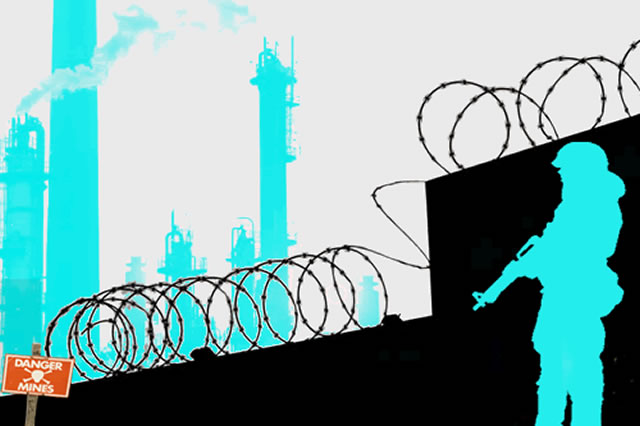With the globalization of economic activities, in certain areas of poor governance, power has effectively shifted from State to corporations. In these permissive environments, corporations have the potential of getting involved in the commission of crimes without any real prospect of being held responsible for their actions. The host countries’ inability or unwillingness to prosecute multinationals has left victims with no hope of getting justice and corporations with little incentives to change their behaviour.
In recent years, NGOs and international organisations have been increasingly scrutinizing corporations and publishing reports on the many links between economic activities, conflict dynamics, and human rights abuses; pressuring home countries - the countries of origin of the investors - to ensure the accountability of their multinational corporations for their conduct abroad.
While States remain the main actors responsible for protecting human rights, it has now become accepted that corporations have a responsibility to respect human rights, which is independent of a State’s duties and the fulfilment of these duties. Clarifying the content of corporate responsibilities is the best way to ensure that companies know which actions they should avoid as well as the proactive steps they should be taking.
Beyond respecting national laws, corporate actions should comply with international human rights law and, in the context of armed conflict, international humanitarian law; two bodies of law that were for the most part developed since World War II to protect human dignity.
Through their activities, business entities potentially impact upon every human right and, in times of conflict, may abuse humanitarian law. Imposing clear duties on corporations, both in negative terms as well as in positive terms is a challenge. The type of activities, the context where these activities take place and the interactions between a company and other actors present on the location of its operations will determine the content and extent of these obligations.
Home countries have tried to address the accountability gap caused by the inadequate regulation of multinationals abroad through, firstly, legislation that aims to regulate the activities of their corporations abroad, mostly in the spheres of corporate law or labour law. Secondly, States have come together with other societal actors to develop a wide array of standards, initiatives and voluntary codes of conduct to advise corporations and give them practical tools for good behaviour.
Although non-binding, these instruments are useful to level the playing field and set the ground for future legal standards. Lastly, States have increasingly extended their traditional jurisdictional powers to adjudicate against corporate actors accused of being involved in the most heinous crimes. This has resulted in an increased number of lawsuits against corporations for actions that took place abroad.
The intense scrutiny of corporate actors and increased risks of litigation should not dissuade corporations from doing business abroad, except when the situation requires it. The development of best practices and tools to perform due diligence exercises will prevent unfortunate events from happening, by allowing companies to evaluate the risk, assess, and react to potentially dangerous situations.
To be effective, these due diligence exercises must be tailored to the company’s overall context of operation, as the company in question must be sensitive to three sets of factors: the country where business activities take place; the human rights impact of its activities within this particular context; and the relationships it enters into to prevent and address the instances where it runs the risk of being complicit in the abuses committed by others. Only when these elements are integrated into the company's overall due diligence processes, will it be ensured that it does not get entangled in dangerous and harmful situations.
There is growing awareness of the application of international law in zones of conflict: The International Committee of Red Cross has published a helpful guide, Business and Humanitarian Law. At the United Nations, the Global Compact has published materials in the past and is developing guidance for businesses operating in high-risk zones. The Organisation for Economic Cooperation and Development has developed a tool to help companies from OECD States operating in high-risk zones, and the OECD is currently developing a due diligence framework in the mining sector to promote responsible behaviour in the industry’s supply chain. The Norwegian think tank FAFO and the British NGO International Alert have published Red Flags, which highlights liability risks for businesses operating in conflict zones.
To explore what is required, what is necessary, what is possible and practical, and what would be desirable for companies in zones of conflict beyond the clear "no-go" areas, the Institute for Human Rights and Business is convening a consultation in Bogota next week, with participants drawn from civil society, businesses, international organisations, academia, and other experts.
There will be a similar consultation later in the year in Africa, leading up to principles and guidelines which clarify corporate roles and responsibilities in conflict zones. Adhering to the principles and framework that emerge from the process may not be sufficient to end violent conflict, but we hope they will guide corporate behaviour so that companies do not contribute to conflict, but rather that their activities help create an environment that respects human rights.





























How should businesses respond to an age of conflict and uncertainty?
As 2024 began, European Commission President Ursula von der Leyen aptly summed up our deeply worrying collective moment. As she put it, speaking at the annual World Economic Forum in Switzerland, we are moving through “an era of conflict and...
26 March 2024 | Commentary
Commentary by Scott Jerbi, Senior Advisor, Policy & Outreach, IHRB